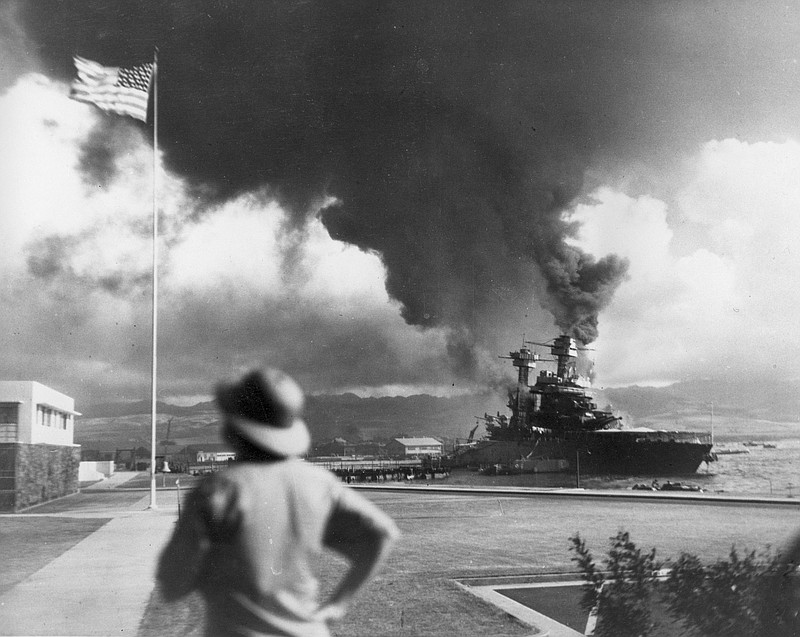Last Monday across Chattanooga and the nation, people paused to remember the events of Dec. 7, 1941. While 79 years have passed since the day that President Franklin D. Roosevelt would famously refer to as "a day which will live in infamy," the impact of that day's events in world history and in the memories of local citizens still resonates.
It had been a quiet Sunday morning. Following church services, most families had returned home to share a favorite meal and had just sat down when the radio crackled with the news of an early morning surprise attack by Japanese forces on the U.S. bases at Pearl Harbor, Hawaii. Citizens would later learn that more than 2,403 members of the American military forces had been killed, with an additional 1,178 severely wounded. Six U.S. ships sank or had been destroyed, and 169 U.S. Navy and Army Air Corps planes had been disabled or destroyed.
In Washington, D.C., the president had also just sat down to lunch when he learned of the attack during a phone call from Secretary of the Navy Frank Knox. Within minutes, members of Congress had been alerted and the president, in consultation with key members of his administration, began drafting the nation's response and his personal remarks.
On that Monday, Dec. 8, 1941, Chattanooga newspaper headlines read "Japanese Declare War on U.S., Our Naval, Army Losses Large; Congress to Hear F.D.R. Today."
In addressing Congress and the nation, the president noted that, while the United States and Japan had been in negotiations about peaceful coexistence, the attack was being planned. He recounted, "The United States was at peace with that nation . . It will be recorded that the distance of Hawaii from Japan makes it obvious that the attack was deliberately planned many days or even weeks ago. During the intervening time the Japanese government has deliberately sought to deceive the United States by false statements and expressions of hope for continued peace."
He would conclude with words remembered with clarity by those who listened to his radio address: "I ask that the Congress declare that since the unprovoked and dastardly attack by Japan on Sunday, December 7, 1941, a state of war has existed between the United States and the Japanese Empire."
In a 2011 interview, the late Luther Masingill, renowned Chattanooga broadcaster, recalled the events surrounding Pearl Harbor. An 18-year-old high school student, Masingill was already working at WDEF-AM and was walking down the hallway at the Volunteer Building when, as he recalled, he heard the news machine begin "dinging" rapidly. An ordinary Sunday morning broadcast that included church announcements took on a new importance. Luther, as Chattanoogans fondly remember him, began to share the first news coming into the station. "The Japanese have attacked the island, our military installation in Oahu, known as Pearl Harbor."
For many in the region, Pearl Harbor and the American forces stationed there seemed far away, but as the reports continued that afternoon, thoughts turned to the recent horrors of The Great War, and residents began to imagine a repeat of that global conflict. The Daily Times the next day echoed those thoughts in its headline "Roosevelt Predicts Final U.S. Victory But Says Nation Faces Long, Hard War."
In a 1966 article written by Mac McNeill, Chattanoogans recalled the initial news. Lillian Henry, at that time an employee at Bell Aircraft Center in Marietta, understood "the seriousness of the situation, especially since I was employed in a plant building military aircraft." Clarence Foster, then a 27-year-old member of the newly created Air Corps stationed at MacDill Field in Florida, was headed home to Chattanooga to visit family when his plans were changed and he was redirected to return to base. He "did not get back to Chattanooga for the next five years," serving with U.S. forces in the Pacific. F.P. Ryan of Lookout Mountain told McNeill that he initially thought the attack was poorly planned since the U.S. forces "were so far superior." But, the U.S. Navy ensign's initial impression changed as he realized the strength and commitment of the Japanese forces. Earl Rucks, a Blue Bird Cab driver, remembered his fares as being "stunned," and the news motivated him to enlist in the Air Corps.
During the next two weeks, as we remember that "day of infamy," we will return to the Greatest Generation's stories of December 1941 and the ensuing years of World War II.
Linda Moss Mines is the Chattanooga-Hamilton County historian and regent, Chief John Ross Chapter, NSDAR.
